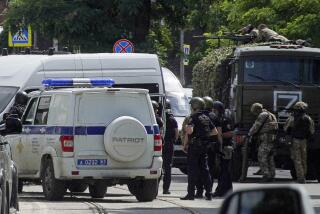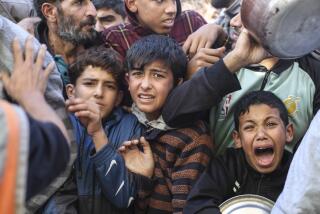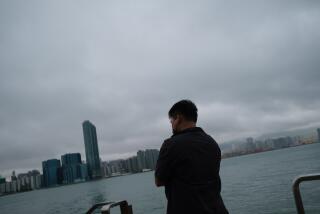Vietnamese Asylum-Seekers Escape Camp
- Share via
HONG KONG — In a desperate attempt to avoid being forced to return to their native land, as many as 200 Vietnamese asylum-seekers broke out of a Hong Kong detention center early today and fled into the hills after setting some of the camp’s buildings on fire.
The well-organized escape began before dawn as groups of migrants, mostly men, cut at least six holes in the wire-mesh fences, police said. Some set fire to their files and fingerprint records in the detention center’s administration building--destroying the facility--and then set ablaze an entire section of the camp before fleeing, Police Supt. Charles Mitchell said.
According to authorities, most of those who fled were scheduled to be moved to another detention center Saturday before being returned to Vietnam against their will.
Police said some of the asylum-seekers escaped out the front gate as reinforcements arrived to stop the breakout. Migrants left behind in the camp took officials hostage and fought police with homemade spears and guns made from filed-down metal piping. The hostages had all been released by noon local time.
Nearby villagers reported seeing families among the fleeing refugees. Just after noon, police led a forlorn woman and her young daughter back into the camp. Police said they had captured 55 of the escapees.
Seventeen camp officers and police were taken to hospitals for treatment of stab wounds and smoke inhalation, but none of the injuries was life-threatening. Seventeen living quarters were burnt and 43 cars were gutted.
Some of the escapees from the Whitehead detention center were believed to have been making their way toward Sha Tin, one of Hong Kong’s most densely populated high-rise suburbs. Some were hiding in the hills.
Hundreds of police swarmed into the area around the camp and launched a search with helicopters and roadblocks. In the course of the morning, riot police fired 500 rounds of tear gas into the camp to quell protests by remaining inmates throwing stones from the roofs of their huts.
A helicopter was used to water-bomb blazing buildings, authorities said, and the fires were doused by mid-afternoon.
The incident was by far the most dramatic effort by any of the nearly 18,000 Vietnamese asylum-seekers in Hong Kong--sometimes called “boat people” in reference to their means of escape from their homeland--to avert repatriation ahead of the 1997 hand-over of this British colony to China.
Beijing has said it will not accept the asylum-seekers after it takes over, and the United Nations is trying to close all Vietnamese detention camps in Southeast Asia. About 36,000 Vietnamese remain in camps in the region, the remnants of the exodus from Vietnam after the end of the Vietnam War in 1975.
Hong Kong has taken a consistently tough attitude toward the migrants, refusing to allow them out of the camps--which are virtual prisons--and into society. Some Vietnamese have been in detention here for as long as 10 years.
The Hong Kong government forcibly returns small groups of the asylum-seekers, classified as economic migrants, every month; those who resist are sometimes carried onto Vietnam-bound planes.
The controversial program has sparked riots in the past. But today’s breakout showed an escalation of the desperation of the Vietnamese, observers said.
Selina Chow, vice chairwoman of the legislature’s security panel, said that violent protests were bound to get worse as the 1997 deadline approaches.
“It is much more ferocious than anything we’ve seen before,” she told government radio. “We have a bunch of very desperate people, and it is inevitable that these exercises will get more and more violent because of the level of resistance.”
In a move to encourage reluctant Vietnamese to voluntarily return home, the United States recently announced that it would accept political refugees “of special interest,” namely those who would be persecuted because of their American ties during the war or because of their ethnicity or religious beliefs.
But those eligible still would have to return to Vietnam to apply.
A court case here recently freed small groups of Vietnamese who also had Taiwanese nationality but who didn’t want to go on to Taiwan.
More to Read
Sign up for Essential California
The most important California stories and recommendations in your inbox every morning.
You may occasionally receive promotional content from the Los Angeles Times.













